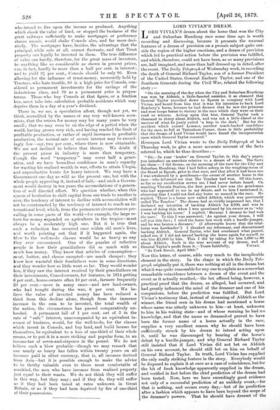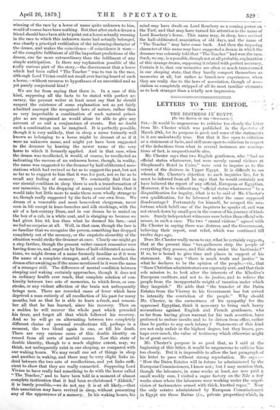LORD VIVIAN'S DREAM.
TORD VIVIAN'S dream about the horse that won the City A and Suburban Handicap race some time ago is worth recording and discussing, because it presents the unusual features of a dream of prevision on a prosaic subject quite out- side the region of the higher emotions, and a dream of prevision which led to practical action before the prevision was fulfilled, and which, therefore, could not have been, as so many previsions are, half imagined, and more than half dressed up in detail, after the event. The Daily Telegraph of Wednesday week, in recording the death of General Richard Taylor, son of a former President of the United States, General Zachary Taylor, and one of the Southern Generals during the Civil War, related the following story :- " On the morning of the day when the City and Suburban Handicap was won by Aldrich, a little-fancied outsider, it so chanced that General Taylor travelled down to Epsom in company with Lord Vivian, and heard from him that it was his intention to back Lord Rosebery's horse, because ho had dreamt that he saw the primrose and rose hoops borne to victory in the race which they were on their road to witness. Acting upon this hint, General Taylor took a thousand to thirty about Aldrich, and was not a little elated at the success of what be justly called a leap in the dark.' But for the
accident which caused Lemnos, another much-backed candidate for the race, to fall at Tattenham Corner, there is little probability that the dream of Lord Vivian would have found the interpretation upon which General Taylor counted."
Hereupon Lord Vivian wrote to the Daily Telegraph of last Thursday week, to give a more accurate account of the facts referred to, which he thus describes :-
" Sir —In your leader' on General Taylor, in this day's paper,
you introduce an anecdote relative to a dream of mine. The facts are these :—I did dream, on the morning of the race for the City and Suburban Handicap, that I had fallen asleep in the weighing-room of the Stand at Epsom, prior to that race, and that after it had been run I was awakened by a gentleman—the owner of another horse in the race—who informed me that The Teacher had won. Of this horse, so far as my recollection serves me, I had never before heard. On reaching Victoria Station, the first person I saw was the gentleman who had appeared to me in my dream, and to him I mentioned it, observing that I could not find any horse so named in the race. He replied, There is a horse now called Aldrich, which was previously called The Teacher.' The dream had so vividly impressed me, that I declared my intention of backing Aldrich for 2100, and was in course of doing this, when I was questioned by his owner as to why I was backing his horse.' I replied, ' Because I dreamt he had won the race.' To this I was answered, As against your dream, I will tell you this fact ; I tried the horse last week with a hurdle-jumper, and he was beaten a distance.' (I afterwards learnt that the trial- horse was Lowlander !) I thanked my informant, and discontinued backing Aldrich. General Taylor, who had overheard what passed, asked me, if I did not intend backing the horse again for myself, to win him E1,000 by him. This I did by taking for him 1,000 to 30 about Aldrich. Such is the true account of my dream, and of General Taylor's profit from it.—Yours faithfully, VIVIAN.
" 5A Cork Street, April 1.6th."
Now this letter, of course, adds very much to the inexplicable element in the story. In the shape in which the Daily Tele- graph originally put it, there was nothing at all in the dream but what it was quite reasonable for any one to explain as a somewhat remarkable coincidence between a dream of the event and the event as it actually resulted,—the bet offered being, however, a practical proof that the dream, as alleged, had occurred, and had greatly influenced the mind of the dreamer and one of his companions, before the prediction was fulfilled. But Lord Vivian's testimony that, instead of dreaming of Aldrich as the winner, the friend seen in his dream had mentioned a horse whose name was utterly unknown to him—at least, unknown to him in his waking state—and of whose running he had n o knowledge, and that the name so dreamed-of proved to have been the former name of a horse actually in the race, supplies a very excellent reason why he should have been sufficiently struck by his dream to intend acting upon it, until he was discouraged • by hearing of the horse's defeat by a hurdle-jumper, and why General Richard Taylor still insisted that if Lord Vivian did not bet on Aldrich on his own account, he should still bet on him on behalf of General Richard Taylor. In truth, Lord Vivian has supplied
the only really striking feature in the story. Everybody would be disposed to explain it at once as a case of coincidence, but for the bit of fresh knowledge apparently supplied in the dream, and verified in fact before the chief prediction of the dream had been tested. Now, here we have exceedingly good evidence not only of a successful prediction of an unlikely event,—for that is nothing, and occurs every day,—but of its prediction after a fashion which appears to have been beyond the scope of the dreamer's powers, That he should have dreamt of the winning of the race by a horse of name quite unknown to him, world of course have beeti nothing. Blitthat after such a. dream a friend should have been able to`point out a horse actually running
in the race to which this anknOwn iianie had actually belonged, was-clearly a practicaLverifiCatien-of the informing' character of the dream, and makes the coincidence—if coinciden-ce it viere-
of the complete fulfilnient of all ihe important predictions of the dream, one far more extraordinary than the fulfilment of any simple anticipation. Is there any explanation possible of the really curious part of the story,—the discernment that a horse which had been called " The Teacher " was to run in the race, although Lord Vivian could not recall ever having heard of such a horse,—without recourse to hypotheses of an unverified and as yet purely conjectural kind ?
We are far from saying that there is. In a case of this kind, supposing all the facts to be stated with perfect ac- curacy, the present writer at least must say that he should suspect the existence of some explanation not as yet fairly admitted amongst the recognised laws of nature, rather than so very improbable a combination of such natural princi- ples as are recognised as would alone be able to give any account of so odd a conjuncture of events. But no doubt such a combination can be imagined. It is perfectly possible, though it is very unlikely, that in sleep a name formerly well known as belonging to a horse might be dreamt of as if it were an unknown name, and might yet have been suggested to the dreamer by healing the newer name of the very horse to which it formerly applied. And in that case, when the dream was recollected, it would, of course, be recollected as indicating the success of an unknown horse, though, in reality, the name was suggested to the dreamer by half-obliterated asso- ciations which had revived so far as to suggest the past, but not so far as to suggest to him that it was his past, not so far as to recall any feeling of memory. We constantly find that in our niental-condition_in sleep there is such a transformation of our memories; by the dropping of _many. essential links, that it would _take but little more to make them seem wholly strange to us, though really suggested by the facts of our own lives. We dream of a venerable and most benevolent clergyman, never seen in life except in knee-breeches and silk stockings, with the air of a last-century Dean, and in our dream he is seated on the box of a cab, in a white coat, and is slanging us because we had giyen him 6d. less than what he deemed his fare,—and we feel no surprise at all. Well, in that case, though the face is so familiar that we recognise the person, something has dropped completely out of the memory, or the exquisite absurdity of the situation would strike the dreamer at once. Clearly one might go a step farther, though the present writer cannot remember ever having done so, and, urged on by lines of half-obliterated associa- tions, we might dream of a name formerly familiar as if it were the name of a complete stranger, and, of course, recollect the dream after awaking as if the name mentioned in it were the name of a stranger still. The difference of mental condition between sleeping and waking certainly approaches, though it does not in ordinary health ever reach, that complete solution of con- tinuity between two sets of memories, to which fever, or sun- stroke, or any violent affection of the brain not unfrequently brings men. There are recorded cases of fever which have deprived a man entirely of all recollection of his past for many months, but so that he is able to learn a-fresh, and remem- ber _ all that he has learned, since his recovery. Then on a sudden.. he will recover the whole past which preceded his fever, and forget all that which followed his recovery. And so he will go on alternating between two completely different chains of personal recollections till, perhaps in a moment, the two blend again in one, or till his death. There are very curious cases of this double identity on record from all sorts of morbid causes. Now this state of double identity, though to a much slighter extent, may, we think, not unfrequently exist in our sleeping, as compared with our waking hours. We may recall one set of things in sleep and another in waking, and there may be very slight links in- deed between the two sets of recollections, and yet links suffi- cient to show that they are really connected. Supposing Lord -Vivian to have really had something to do with the horse called "The _Teacher," and to have been- told in a moment of almost .complete inattention that it had been re-christened "Aldrich," it is -barely possible, we do not_say, it is at all likely,—that this association may have revived in sleep, without presenting any of the appearance of a memo-ry.__ In his waking hours, his
mind may have dwelt on Lord Rosebery as a coining power on • the Turf, and-that may. have Wined his attention to the name of Lord Rosebery's horse.-..This itaine may, in sleep, have revived the half-obliterated, association of old days, and the name of " The Teachei " May hive come back. And then the imposing character of this name may have suggested a dream in which the dreamer was solemnly told that "The Teacher" had won the race. Such, we say, is a possible, though not at all probable, explanation . of this strange dream, supposing it related with perfect accuracy. Certain it is, that our memories are often so much transformed in our sleeping state, that they hardly comport themselves as memories at all, but rather as brand-new experiences, when they are really due to the laws of association, though of asso- ciation so completely stripped of all its most familiar elements as to look stranger than a totally new impression.



































 Previous page
Previous page